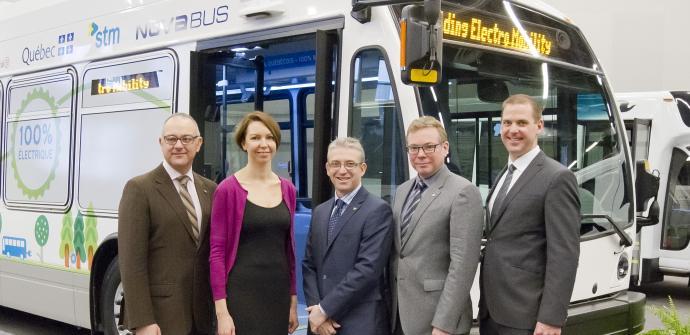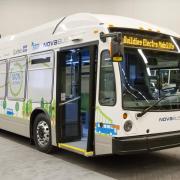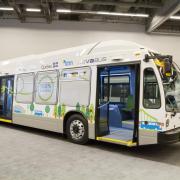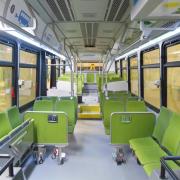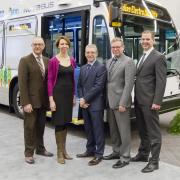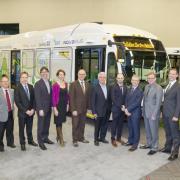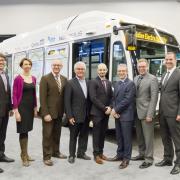Earlier this morning, the STM and Nova Bus, now a part of Volvo Group, welcomed the Canadian members of the public transit industry for the unveiling of the new visual identity for Montréal’s City Mobility project. Montrealers and other visitors will easily recognize fully electric buses thanks to a distinct look that sets them apart from STM’s standard buses.
Earlier this morning, the STM and Nova Bus, now a part of Volvo Group, welcomed the Canadian members of the public transit industry for the unveiling of the new visual identity for Montréal’s City Mobility project. Montrealers and other visitors will easily recognize fully electric buses thanks to a distinct look that sets them apart from STM’s standard buses.
The City Mobility program aims to give key players the momentum needed to undertake innovative, integrated and sustainable pilot projects. It includes new technologies designed by Volvo and its subsidiaries, like the fully electric buses by Nova Bus, to improve energy efficiency and reduce the rate of greenhouse gas emissions.
Montréal, a pioneer for public transit electrification
The program was deployed in nine cities and Montréal is the first North American city to take part in it. In Montréal, the project consists of installing two quick-recharging stations along the route taken by the STM’s 36 – Monk bus line in order to put three fully-electric Nova LFSe buses into passenger service. The two quick-recharging stations will be built in spring 2016, in Square Victoria and at the Angrignon terminus. Testing without passengers will begin in 2016 and will be followed by passenger service. Testing will continue until 2019.
The three LFSe buses, designed under the direction of Nova Bus as part of an electric bus consortium, will each have four batteries onboard, each one fully powered by Québec hydroelectricity, thanks to the quick recharging system, and equipped with a TM4 engine, also designed in Québec.
Partners for public transit electrification
Covering a three-year period, Montréal’s City Mobility project has a $16.7 M budget, of which $11.9 M are a subsidy from the ministère des Transports du Québec (MTQ) and $100,000 from Hydro-Québec. Furthermore, in order to make this project possible, Volvo and Nova Bus also invested $8 M in research and development for the electric bus transit system.
Photos
LÉGENDE
- 1ère photo, de gauche à droite : Aref Salem, membre du comité exécutif de la Ville de Montréal et responsable du transport; Jessica Sandström, vp principale, Volvo; Luc Tremblay, directeur général, STM; Philippe Schnobb, président du CA, STM; Martin Larose, Vice-président, Bureau de gestion de projet, Volvo Bus, Nova Bus et Prevost
- 2e photo, de gauche à droite : Denis Pomerleau, conseiller corporatif- électrification, STM; Roger Vandal, chef de division-Études techniques, STM; Daniel Daviau, chef de programme Cité Mobilité, Nova Bus; Daniel Bergeron, président du CA de l’ACTU; Jessica Sandström, vp principale, Volvo; Aref Salem, membre du comité exécutif de la Ville de Montréal et responsable du transport; Paul Côté, pdg, AMT; Patrick Leclerc, pdg, ACTU; Luc Tremblay, directeur général, STM; Philippe Schnobb, président du CA, STM; Martin Larose, Vice-président, Bureau de gestion de projet, Volvo Bus, Nova Bus et Prevost
- 3e photo, de gauche à droite : Daniel Bergeron, président du CA de l’ACTU; Jessica Sandström, vp principale, Volvo; Aref Salem, membre du comité exécutif de la Ville de Montréal et responsable du transport; Paul Côté, pdg, AMT; Patrick Leclerc, pdg, ACTU; Luc Tremblay, directeur général, STM; Philippe Schnobb, président du CA, STM; Martin Larose, Vice-président, Bureau de gestion de projet, Volvo Bus, Nova Bus et Prevost
